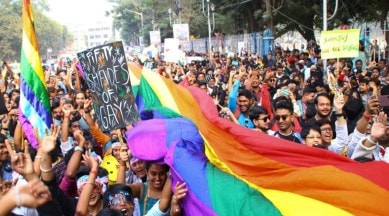Stay updated with the latest - Click here to follow us on Instagram
‘Non-heterosexual unions are entitled to protection under Constitution’: Top quotes from SC verdict on same-sex marriage
Delivering his judgement on marriage equality in the SC today, Chief Justice of India D Y Chandrachud emphasised that labeling marriage as a fixed and unchanging institution is not accurate

The Supreme Court on Tuesday ruled against legalising same-sex marriage. The matter was decided by a five-judge Constitution bench, headed by CJI D Y Chandrachud. Rejecting petitions seeking same-sex marriage in the country, all five judges agreed that there was no fundamental right for non-heterosexual couples to marry. The Bench also included Justices Sanjay Kishan Kaul, S Ravindra Bhat, P S Narasimha, and Hima Kohli. In his opinion , the CJI has left it to the Parliament to decide on the issue.
The apex court had heard the arguments over 10 days in April and May. The focus of the petitions filed is the gender neutral interpretation of the Special Marriage Act. The SMA is a secular legislation designed to facilitate inter-caste and inter-faith marriages. The petitioners had sought a broader interpretation of the SMA to include same-sex marriages too.
monthly limit of free stories.
with an Express account.
The opposing parties in the case comprised the Central government, the National Commission for Protection of Child Rights (NCPCR), and Jamiat-Ulama-i-Hind, an organisation of Islamic scholars.
Here are the top quotes from the hearing:
1) Delivering his judgement on marriage equality in the SC today, Chief Justice of India D Y Chandrachud emphasised that labeling marriage as a fixed and unchanging institution is not accurate. “It would be incorrect to state that marriage is a static and unchanging institution,” the CJI noted.
2) The CJI also pointed out that “queerness is neither urban nor elite.” “To imagine queer as existing only in urban spaces would be like erasing them, queerness can be regardless of one’s caste or class,” he said.
3) CJI Chandrachud stated that the court is not empowered to create laws; its role lies in interpreting and enforcing existing law. ” The court can’t make law. It can only interpret it and give effect to it, ” he said.
4) Further, he noted that if section 4 of the Special Marriage Act is striked down, “benefits of a progressive legislation would be lost.” Saying that “it will take country to pre-Indpendence era,” he highlighted that “if court reads into SMA or Indian Succession Act or Hindu Succession Act, it would be entering into field of legislature.” “Supreme Court cannot strike down provisions of SMA, Parliament needs to decide on issue, ” he added.
5) “The right to enter into a union includes the right to select one’s partner and have that choice acknowledged; the failure to acknowledge such unions is deemed discriminatory,” CJI Chandrachud said.
6) “The ability to choose one’s life partner goes to the root of the right to life and liberty as defined in Article 21,” Chief Justice Chandrachud noted.
7) “All persons, including those queer, have the right to judge the moral quality of their lives. This court has recognised that equality demands that queer persons are not discriminated against,” CJI Chandrachud noted.
8) “The law cannot assume that only heterosexual couples can be good parents as it would amount to discrimination against queer couples,” the CJI pointed out.
9) CJI Chandrachud issued instructions to the police, prohibiting them from summoning members of the queer community to police stations solely for inquiries about their sexual identity.
“They should not be forced to return to their natal family if they don’t want to,” he added.
10) Chief Justice Chandrachud also issued a set of directives to the government, aimed at safeguarding the rights and well-being of the queer community. These directives include a mandate to prevent discrimination against the queer community, ensure equitable access to goods and services, promote public awareness about queer rights, establish a dedicated hotline for the queer community, provide safe housing options, or “Garima grih” for queer couples and prohibit the forced medical operations on inter-sex children.
11) Justice S K Kaul agreed with the Chief Justice on the grant of certain rights to queer couples.
“Legal recognition of non-heterosexual unions is a step towards marriage equality. Non-heterosexual unions are entitled to protection under the Constitution. Non-heterosexual and heterosexual unions must be seen as both sides of the same coin,” Justice Kaul said.
12) Justice Ravindra Bhat expresses his dissent concerning the directives provided by the Chief Justice pertaining to the Special Marriage Act. While Justice Bhat acknowledges certain aspects of the Chief Justice’s reasoning, he differs in terms of the final conclusions. Instead, he aligns with the conclusions outlined in Justice Narasimha’s judgment.
Justice Bhat leaves it to the Parliament to decide. “We do not particularly subscribe to the views of CJI on democratising intimate spaces…these outcomes were brought by legislative acts,” he noted.
13) Justice Bhat disagreed with the CJI on the right of queer couples to adopt. “Queer persons have the right to choose partners, State cannot be obligated to recognise rights flowing from such union,” he added.
He also said that the Centre’s high-powered committee must take a call on making policy changes.
14) Justice S Ravindra Bhat, further, said, “A citizen cannot seek the construction of a network of roads to enforce the right to travel”.
He was arguing that the Court cannot grant a bouquet of rights without a legislative framework for same-sex marriage to give effect to the rights of queer persons.
15) Emphasising that queer couples have the “right to live together unhindered and undisturbed,” Justice Bhat said “there is no qualified right of marriage in the absence of law.”
16) Meanwhile, Justice Hima Kohli said she agreed with the judgement authored by Justice S Ravindra Bhat.
Claiming that “there is no unqualified right to marry,” Justice Narasimha agreed with Justices Bhat and Kohli in his judgement.